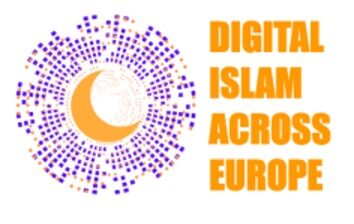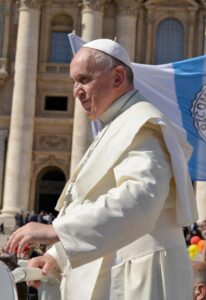
Anna Grasso (UK Team and Website data analysis)
Gary R Bunt (UK Team and Website data analysis)
Reactions from organisations’ websites
This analysis is in part based on the Digital Islam Across Europe collection on this subject. One of the DigitIslam project outputs focuses on website data and collection analysis. The objective is to identify, catalogue and analyse Muslim organisations’ and actors’ websites (Online Islamic Environments or OIEs) from these different countries.1 This collection consists of archived articles and reactions by Muslim online organisations, religious authority figures, and media platforms from countries involved in the DigitIslam project regarding the passing of Pope Francis on 21 April 2025.
We were able to identify and document reactions to the passing of Pope Francis from Muslim organisations and individual actors across all our countries of focus: namely the UK, Spain, Sweden, Poland, and Lithuania. This widespread response is deeply symbolic, highlighting the far-reaching impact of Pope Francis’s legacy not only within the Catholic world but also across religious and cultural boundaries.
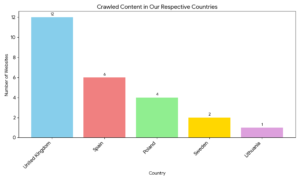
Data Source: User-provided data; Graph Generated by: Gemini (AI large language model), June 27, 2025
Content also reflected the plurality of Islam. We had reactions from Sunni mainstream sources as well as Twelver and Ismaili Shia, Hizmet movement and the Ahmadiyya community. This also reflects a broader strategy employed by smaller, often marginalised, Muslim communities to engage in interfaith dialogue initiatives as a means of enhancing their visibility and legitimacy on the global stage. More generally, showcasing interactions with such an influential global leader helps to enhance the prestige of these organisations and their representatives.

Data Source: User-provided data; Graph Generated by: Gemini (AI large language model), June 27, 2025
Reactions on Social Media channels
Some Muslim organisations issues statements exclusively on social media (we included content from X/Twitter, Instagram and Facebook). This was the case of the Ahmadiyya community branch in Lithuania, the Al-Khoei foundation’s UK branch (Twlver Shia), The Dialogue Society in the UK (Hizmet), and the Islamic Community of Valencia (Sunni).
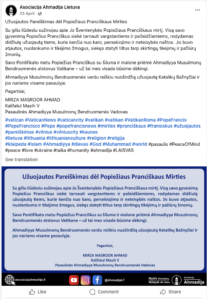
The post is a Lithuanian translation of a formal message of condolence from Mirza Masroor Ahmad, the leader of the Ahmadiyya Muslim Community, expressing sympathy and respect following the death of Pope Francis. The Ahmadiyya Lithuanian website has become inactive since this period (April 2025). They continue posting on their Facebook page.
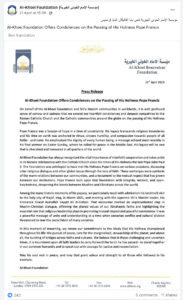
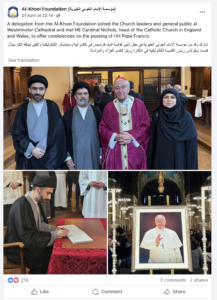
The Al-Khoei Foundation’s UK branch also posted an official message of condolences on their Facebook page accompanied by photos showing a delegation from the foundation meeting the head of the Catholic community in England and Wales. A more recent post also shared photos of a delegation participating in the Pope’s funeral. The Foundation has a webpage but they only seem to post community announcements.
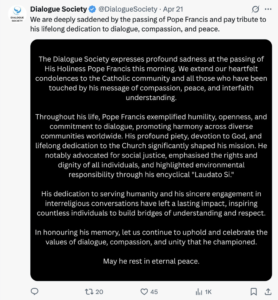
The Dialogue Society also posted an official condolence message on their X/Twitter page. As the Al-Khoei Foundation, they have a website but use it to publish events relating to the community.
We are deeply saddened by the passing of Pope Francis and pay tribute to his lifelong dedication to dialogue, compassion, and peace. pic.twitter.com/SRSvBivIki
— Dialogue Society (@DialogueSociety) April 21, 2025
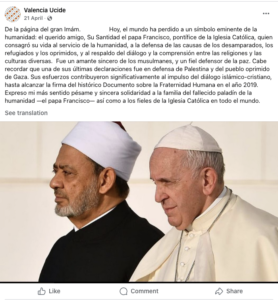
The Islamic Community of Valencia shared a post on Facebook with a tribute from the Grand Imam of Al-Azhar mourning the death of Pope Francis. It highlights the Pope’s support for the oppressed, including the people of Gaza, and his role in fostering Christian-Muslim relations. The Islamic Community of Valencia have a website but they no longer use it to post events since 2014.
Reactions from religious authority figures
In his pursuit of interfaith dialogue, Pope Francis travelled extensively and met with numerous Muslim religious leaders. This aspect of his legacy is frequently mentioned in the statements issued upon his passing. As with the Islamic Community of Valencia’s post, many tributes highlight the Pope’s encounter with Ahmad Al-Tayyib, Grand Imam of Al-Azhar, and the signing of the “Document on Human Fraternity“. This is noted on websites from Spain, the United Kingdom (5Pillars), and Lithuania (Balturka).
Numerous Twelver Shia sources have shared the message of condolence from Grand Ayatollah Sayyid Al-Sistani, recalling his meeting with the Pope in 2021. This message appears on websites based in the United Kingdom and Sweden. The Shia Ismaili leader, Aga Khan Mawlana Hazar Imam, also expressed his condolences, sharing a photograph from one of his meetings with the pontiff and writing: “I recall with great warmth my meetings with His Holiness and our discussions on humanity’s shared principles and values.”
Furthermore, the Hizmet movement published statements of condolence following Pope Francis’s death, with posts appearing on websites from Poland and Lithuania, as well as on UK-based social media. A message posted on the Balturka website also recalls a meeting between the movement’s late leader, Fetullah Gülen, and Pope John Paul II in 1998.
Other Muslim religious leaders, while not necessarily having met the Pope personally, nonetheless acknowledged his efforts and affirmed their shared commitment to dialogue. One such example is the Ahmadiyya community leader, Mirza Masroor Ahmad. Although he did not meet the Pope himself, the Ahmadiyya newspaper Al Hakam recounts a meeting in 2021 between Ahmadiyya missionaries and Pope Francis. During this meeting, they shared a message and information about their leader’s work, which the Pope received with great respect. In addition, the Ahmadiyya religious leader exchanged written correspondence with both Pope Francis and his predecessor.
Pope Francis as a supporter of gobal Muslim rights
Some of the statements and news articles we saved also emphasised Pope Francis’s defence of Muslim rights, highlighting both his rejection of Islamophobic discourse and his support for the people of Gaza.
Two news articles from the United Kingdom discussed the passing of the Pope in connection with the issue of Islamophobia. The first article, from the 5Pillars news website, stressed Pope Francis’s firm stance against Islamophobia. The second article, from the S2J news website, highlighted a far-right British politician’s Islamophobic remarks in a now-deleted post criticising the BBC and mainstream media for featuring images of veiled “Muslim” women mourning the Pope’s death, despite the women actually being Catholic nuns.
Some online sources also praised Pope Francis’s numerous appeals in support of the people of Gaza and for a ceasefire. Nonetheless, in the comments section of the Islamic Commission of Spain’s social media post, we observed one individual who questioned the need to issue statements about the death of a single person – be it the Pope – given the ongoing deaths of many children in Gaza. However, his comment prompted responses that refuted this stance, with others portraying the Pope as a good person who had shown concern for the people of Gaza.
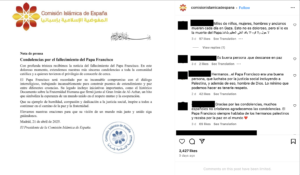
We believe this data can become a useful tool for researchers and the general public who have an interest in digital Islam across Europe as well as those who are mostly focused on the study of Christian Muslim interfaith dialogue. Moreover, the analysis of these sites will be part of a wider project output through presentations and publications.
- For more information on this: https://blogs.ed.ac.uk/digitalislameurope/research-findings/archiving/ back
Image by Annett_Klingner from Pixabay
